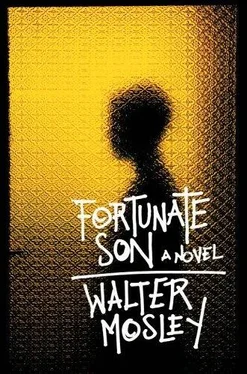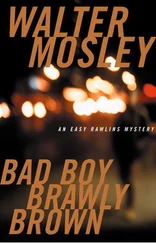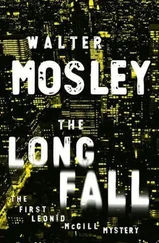When she placed her cold hand on his erection, he giggled and sat up.
“Lay back,” she said.
Bolstering the small erection from behind with her four fingers, she began rubbing the underside with her thumb.
“Wh-what you doin’, Monique?”
“Givin’ you a birthday present.”
“What is it?” he asked.
“You know. I feel you gettin’ hard in the bed when I hug you sometimes at night.”
The boy put his hands to her wrist as if to hold her in place, and she moved her thumb lightly and fast. He came all at once and shouted, “Uh-oh!”
“It’s okay,” she said. “That’s what you supposed to do. When you have a real girlfriend, you s’posed to do that in her coochy.”
She kept moving her thumb, using the greasy white come as a lubricant.
“That tickle,” he said, squirming now.
“It’a feel good in a minute,” she assured him. “I used to do this for Tony when I was pregnant. I’ma only do it this one time for you ’cause it’s your birthday an’ you been so good to me an’ Lily.”
Thomas came three more times. Then they lay together, his head on her naked breast. He didn’t know if he felt good or bad. He couldn’t slow his mind down, and in the middle of the night he went to the restroom and threw up. When he got back to bed he felt calmer. On his way to sleep he thought about Lily and wished that she was home with them.
The next day the bust came down on Tremont’s alley.
Police cars rolled up with their sirens blaring and their bullhorns commanding everyone to put his hands in the air. When Tremont came out shooting his Uzi, the police opened fire. Tremont went down immediately, and even though he was the only one shooting at them, the police kept firing until there were three dead, including Chilly, and another five wounded.
Thomas was hit in the chest, another hole in his lung. He was kept in the police ward of General Hospital, unconscious and near death, for more than a month. When he regained consciousness he was still very weak. Monique came to visit him only twice because now she had to work full-time and take care of Lily too.
At the trial Thomas’s court-appointed lawyer, a kind old man named Sam Neiman, said that Thomas was a virtual orphan, that he’d lived by his wits since a very early age. He said that the system had failed the boy. He was illiterate and wild. There was no proof that he was firing at the police. He dealt drugs because it was the only way to survive.
The prosecutor was a young white woman, Flora Pride.
“The fact remains, Your Honor,” Flora said, “that Mr. Beerman was a willing member of the Tremont gang. He has been implicated in at least one homicide, a Raymond Smith, also known as RayRay, and he dealt drugs every day for the past three years. He resisted arrest with violence and was wounded by policemen afraid for their lives.”
The judge sentenced Thomas to nine years with the juvenile authority in the hope that they might rehabilitate him.
“I’m sorry, son,” Mr. Neiman told him after the trial. “If you were tried as an adult, the sentence would have probably been less. But as it is, the system was against you.”
Thomas thanked his lawyer for being nice to him, and then he was taken to a prison camp for boys on the outskirts of the eastern desert.
Many things happened to him there. Between the guards and the boy gang leaders and the cramped life of lockdown, Thomas suffered. He was slashed, gang-raped repeatedly, beaten, and then punished by the guards for being a troublemaker. But he learned to ignore his wounds and humiliations when he wasn’t actually faced with them. At night he would sink to his knees on the stone floor and feel his mother in the earth.
He was in the worst child prison because he had been convicted of a violent crime. No one thought he belonged there, not even his torturers. After a year or so the punishments and molestations ended. He remembered how to read in the classroom he was brought to three times a week. He spent as many hours as he could in the library and fell under the protection of a bigger boy named Bo.
Bo wasn’t tall, but he was the strongest boy on their floor, maybe in the whole facility. He liked to have Thomas around him on the yard, called him his “bad luck charm.” And when other boys would ask him why he’d want something like that, he’d say, “Without bad luck I wouldn’t have no luck at all.”
At the age of fourteen, around the same time that Eric faced off with Drew, Thomas was transferred to a minimum-security home in Los Angeles. Three days after he got there, he wandered away.
He was outside on the gray wood porch, and there was no one else there. He hadn’t had a walk down a city street in so long that he said to himself that he’d just go around the block. But when he got to the end of the block, he took one left and kept on going.
For three days he traveled across the city on foot. At night he slept in alleys behind pizza restaurants that provided his dinner in their overflowing Dumpsters. He couldn’t eat the cheese, but the crusts kept him from starving.
He asked directions in the daytime and finally made it to Monique’s apartment. An old man lived there now so Thomas went to Bruno and Monique’s old house.
Their parents told Thomas that Monique was living in Compton. After some hesitation they gave him her address.
When he made it to her street it was already evening.
She lived in a white house that had a lawn behind a wire fence and toys on the porch.
The door was open, but the screen was closed. When Thomas rang the bell, a chubby little girl came to answer.
“Hi,” she said.
“Lily?”
“Uh-huh. Who are you?”
“I’m Thomas.”
“Do you know Harold?”
“I know your mother,” the escapee said.
“Mom!” Lily shouted, and then ran into the house.
Monique came lazily to the door wearing a big blue robe. When she saw Thomas her eyes opened wide.
“Lucky?”
“Hi, Monique.”
“Lucky, what you doin’ here?”
“I wanted to see you and Lily. She’s big.”
While Monique and Thomas talked, a shadow came up behind her.
“Who’s this?” a man’s voice said in a tone neither friendly nor unfriendly.
“This is Lucky, Harold,” Monique said.
“What does he want?”
“He’s my friend.”
“He looks like a bum.”
Harold was a tall man with bronze skin, a receding hairline (even though he didn’t look much over thirty), and a large, powerful-looking belly. He had no eyebrows at all, small eyes, and large hands.
“He’s my friend,” Monique said with authority.
“What does he want?”
“Come on in, Lucky, and go have a seat in the living room.”
“Oh, no,” Harold said. “I ain’t havin’ this ratty-lookin’ niggah sittin’ on my new furniture.”
Thomas held back, but Monique said, “Come on in, Lucky. Harold ain’t gonna touch you if he know what’s good for him.”
“Monique,” Harold said. That one word carried a whole chapter of information.
“Don’t you ‘Monique’ me, Harold Portman. I put up with your thievin’ sister, your drunk father, and them three friends’a yours leave my house in a shambles every other Saturday night. Your mother lived with us for six months, so either my one friend is gonna come up in here or you’n me gonna talk.”
Harold turned on his heel and walked from the room.
“Wait for me in the living room, Lucky,” Monique said, and then she went after Harold.
They had nice green furniture on a golden carpet. The TV was tuned to a cartoon show, but Thomas didn’t watch. He sat down on a straight-backed wood chair and clasped his hands on his lap. Looking down, he could see that his hands were dirty and his light-blue pants were stained by alley grease.
Читать дальше












